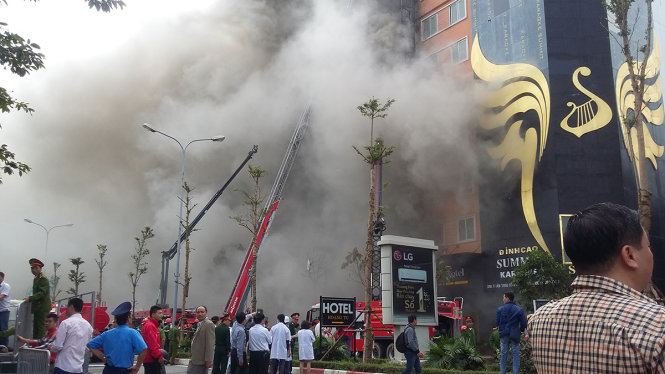Editor's note: Two people from Japan and Singapore have shared their thoughts with Tuoi Tre News on safety regulations in karaoke bars.
The opinions were given following recently reignited concerns in Vietnam that most karaoke bars are unsafe conversions from residential homes and lack the appropriate emergency exits.
Earlier this month, a fire in a karaoke bar in Hanoi that killed 13 was found to have been started by the careless welding of billboards that caused nearby flammable objects to spark, with the rescue of trapped customers hindered by large iron frames caging the front of the building. The fatal incident once again raised safety concerns over Vietnam’s karaoke bars, the majority of which are merely converted residential homes. Some of the bars have only a single doorway that serves as both the entrance and exit, usually between four and eight meters wide.
Unsafe fire conditions kill
I've been to this type of karaoke bar in Vietnam, and as far as safety is concerned, I'm afraid that I never thought seriously about it. I thought that a karaoke bar could make food without using fire and I believed that I would be protected by fire protection laws in Vietnam.
In Japan, the law prohibits the operation of karaoke bars in residential areas, so karaoke venues are located around train stations, in commercial buildings and near shopping malls.
According to the Japanese Association of Karaoke Enterprises, there were 9,555 karaoke bars in Japan in 2015, with 47.5 million karaoke users.
As for the law in Japan, all buildings must obey fire protection regulations. Fire protection laws were enhanced on October 25, 2002, after a fire in a multipurpose building of Shinjuku, Tokyo, on September 1 the previous year. Forty-four people were killed and three injured in the incident, the 5th largest fire tragedy in the 70 years since WWII in Japan.
Causes of the fire included an accumulation of objects in the building’s narrow staircases, the fact that the building had only one evacuation passage from the upper floor, and finally, nobody had inspected the automatic fire alarm and a fire drill had never been carried out.
The fire led to the Japanese government's inspection of the country’s "multipurpose buildings." Violations were found in over 90%, meaning the Japanese government took immediate action and changed fire laws to prevent the recurrence of violations.
Punishment for people who violated the laws changed from a maximum of one year of imprisonment or a fine of up to five hundred thousand yen to a maximum of three years of imprisonment or a fine of up to three million yen.
The result has been fewer incidents since October 2002, with all building owners required to be aware of fire security.

Hirate Yosuke, Japanese
Regular audits prevent negligence on safety
I think karaoke is a fun social activity to get people together. Living here for almost half a year, I’ve been to some karaoke bars in Vietnam. I didn't really pay attention to safety but I remember that the walkways and staircases at one place were too narrow. Another one had 7 storeys and very narrow walkways as well. The lift didn’t look like it had been maintained well either. Not much safety there.
In Singapore, the karaoke bars are in shopping malls or in shophouses, not in residential homes. Commercial businesses can only operate in commercial buildings. You will not see a karaoke bar in a residential building. That is illegal. The karaoke bars follow either the shopping mall regulations or building regulations and are audited for fire safety by appointed government bodies. Firefighting systems such as sprinklers and fire extinguishers have to be in place and clear exit signs put up. These businesses have to pass fire safety audits before they are allowed to operate, and I believe they are audited every year.
If the karaoke bar is new and it fails to comply with safety regulations, it is not allowed to operate. If safety standards are not met after an audit, the karaoke bar will be given a period of time to make corrections and be fined. I'm not sure how much the fine is. Probably you can find out on the regulation websites. If they fail to improve in the given time period, the business will be ordered to shut down.
I believe in safety audits/regulations enforced by the government. This prevents negligence on safety.
There’s another concern related to karaoke bars that I’ve experienced in my apartment a few times. The building across the road has the volume turned on so loud but I have no idea why, as it’s not even a karaoke bar. They were singing from 11:00 pm through 3:00 am? Absolutely ridiculous. There was no conscience in them or manners to think that there are many other people who are trying to sleep. So inconsiderate.
In general, after 10:00 pm/11:00 pm, there should be reduced noise unless you're in a commercial area where people are not staying. It's hard to put a penalty on this. I think people should just be considerate and these kinds of things won't happen. Or they could be made more aware of how disturbing it actually is for the people around them.
It happens in Singapore and we deal with it by calling the police. The police will show up at their doorstep to ask them politely to reduce their volume as it is late at night. If they do not comply and the neighbors call the police again, the police will arrest them for causing a public disturbance. Singaporeans usually won't repeat something after the police show up.

Harvard Chong, Singaporean






















































